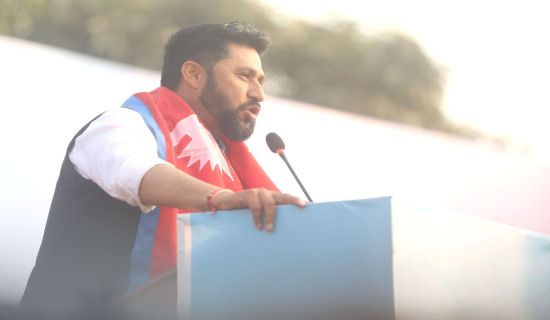- Tuesday, 20 January 2026
Voice Of The Oppressed
Readers generally don't notice the figure of the arrow in the abstract painting on the cover of the book 'Lahana ra Teer' (translated as civilization and arrow), let alone take it seriously. But when one turns the pages of the book and immerses oneself in the fiery expressions of Abhaya Shrestha, a realisation peeps into the mind that it actually is the weapon targeted against the enemies of the downtrodden people—Dalits, women, and all those shorts whom Karl Marx labeled as 'proletariat.'.
The anthology of poems reaches to the readers with deep philosophical meanings carrying the deep ideas of peace and rebellion. Those who appreciate 'progressive literature,' which is basically considered the domain of the leftist, would find a superb integration of thought and art in Shrestha's poems. He emerges as one of the staunch advocates of the rights of Dalits and calls them to reclaim their lost privileges. In 'Nilo Ragat,' he talks about the selfish and oppressive upper class that trades the fear and sorrow of the poor and Dalits with monetary rewards.
Another philosophical poem, 'Naam,' is the poet's reaction to the environment, immediate events, and crime against women, Dalits, and the poor. Supplementing the recent history, the poet tries to give voice to the voiceless. Another story of the enigmatic character 'he' says that the weapons that he created for the rulers have been used against him. He recollects the reminiscences of the April Movement that overthrew the monarchy.
I am a strange petition,
Filed in the eternal court of time,
Who are you to silence me,
In every reign and regime? (p. 93)
The creations can be taken as the representative voice against our time, where people have a high level of despair and hopelessness due to the prolonged political transition and instability, rampant corruption, failure to uproot the social maladies, and lack of economic opportunities. In a poem about a martyr, the poet declares that his death was the supreme counterattack against the world full of tears and oppression. Shrestha challenges 'them' who have the watches with 'his' time. He expresses worries over the unmanaged governance system in his country. In 'Sabhyatako Mahayatra (long journey of civilization), he says:
In the grasp of those who play their parts,
Reveling in the carnage of their own dreams,
The nation strides forward in grand parade,
As though steered by a driver lost in sleep's embrace. (p. 11)
The poet doubts everything around him, including his own conscience, and suggests all to doubt even Buddha, who taught the world about the doubt. His philosophy seems to be equally influenced by Lord Buddha and French philosopher René Descartes, who famously said, 'I think, therefore I am.' Descartes' philosophy also bases itself on doubt, and he says, when he doubts, he begins thinking, which makes him realise that he is a thinking being. Hence, doubt is at the heart of human intellectual supremacy.
Multiple poems in the book deal with the plight of Dalits and women in Nepal and call for their emancipation, and such liberation could only be made possible through breaking the doors and ceilings. Shrestha is highly critical of the traditions and religious scriptures that promote dogmatic values and segregation against the Dalits and discrimination against the women. He is daring enough to call a spade a spade while talking about religions and traditions influenced by them.
The sun of your liberation
Would rise in the sky
Of your three-and-a-half-millennia-old anger.
(p. 31)
It gives a soothing pleasure while going through the poems in 'Lahana ra Teer' that a male could talk so eloquently, precisely, and accurately about the liberation of women. He hopes for a revolt by the women and calls for such a revolt. Badi girl, sister-in-law, mother, goddess, prostitute, and actress are the major women characters that are featured prominently in his poems. He talks about almost every critical woman character—from Miss World to nun and from mother to sister-in-law—in our society. You should read the book to get a male's perspective on women's plight.
However, too much rebellion could be hard to digest for some readers. Some of his ideas are rather vague due to their linkages to ancient myths, medieval practices, and modern society. He maintains that the 'idea versus art' debate for poetry is a sponsored collusion to make the poems soulless. "A poem without thought is lifeless, and a poem without art is just a word pile," he says. Shrestha's poems demand a certain level of philosophical foundations and general knowledge in politics and society in the readers. So it is up to the readers whether they accept this challenge.
'Lahana ra Teer' is one of the best contributions that happened in the field of Nepali poetry in 2024. It will remain as a voice for the voiceless women, Dalits, and many marginalised people. It will continue to motivate people to question those in power and fight for an equitable society.
(Dhakal is a journalist at The Rising Nepal.)

















